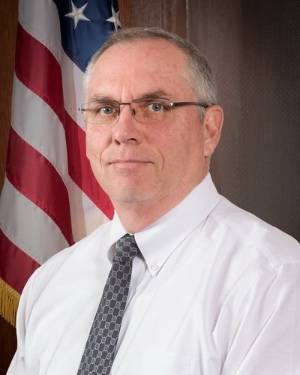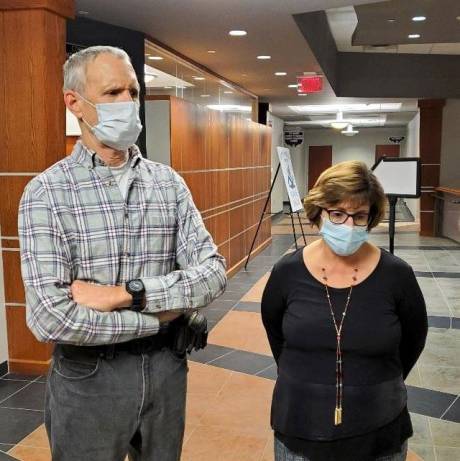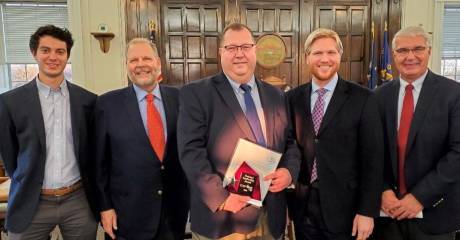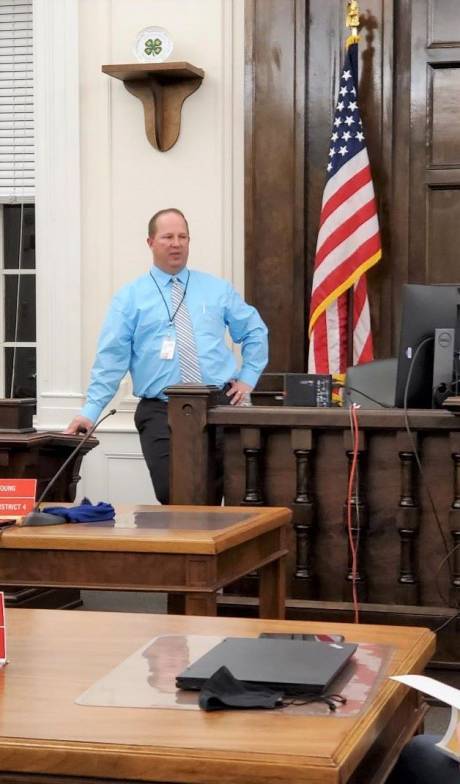Matt Worth emphasizes bond with coworkers as he reflects upon long career with City of Batavia

“The people I have worked with I just can’t say enough about. I’m getting all choked up thinking about it, really,” Worth said during a telephone interview with The Batavian as he winds down a distinguished career with the city.
Worth’s official retirement date is Jan. 15, but his last day on the job – due to time earned – is Dec. 11.
His final City Council meeting is tonight’s Conference session at the City Centre Council Board Room, where he will receive a proclamation from lawmakers, honoring him for his dedicated service.
The 56-year-old lifelong resident of the Pembroke area said he has a special place in his heart for the people who believed in him and labored by his side.
“A lot of people gave me an opportunity or a chance, and I can’t thank them enough. I can name names, but I don’t want to leave anyone out,” he said.
Still, he first mentioned (the late) Dennis Larson, the former Public Works director who hired him back in March 1987 – “Dennis is someone I always thought the world of,” Worth said – and he thanked John Schaefer (former Water & Wastewater superintendent) and Len Walker (former Public Works director) for their expertise.
City Workers a Close-Knit Group
When it comes to his coworkers, Worth said they were like family.
“Those guys were special. When there was a water main break in the middle of the night and you’re out there in the freezing cold, you counted on each other to be there for each other,” he said. “Jim Ficarella and Bill Davis (retired and current Water & Wastewater superintendents, respectively), and the crews. There’s a sense of camaraderie and friendship and professionalism that I will always treasure.”
Worth began his career with the city – following a short stint with the Genesee County Highway Department – as an engineering technician and was promoted to deputy superintendent of water/wastewater in 1999. He took over as superintendent of that department three years later.
In July 2015, he was appointed Public Works director. The promotion put him in charge of the Bureau of Maintenance (Streets & Sidewalks), Bureau of Water and Wastewater (Water Plant and Sewer Plant), Bureau of Inspections (Code Enforcement) and Bureau of Engineering, with responsibility for approximately 50 employees.
During his tenure, he has been involved in numerous public works projects, including street reconstruction, water and sewer plant upgrades, and capital infrastructure planning.
“The projects that we’ve done over the years are the things that I’ve really craved,” he offered. “A project gets done and there’s a tangible change that happened – something that you can really see … the road got plowed, the road got paved, a new water line got put in, whatever that may be.”
Keeping a Low Profile is Just Fine
He said he understands how important public works are to residents and doesn’t mind flying under the radar.
“If we’re doing it right, the people don’t notice you’re doing it. There’s a certain satisfaction in that,” he said.
“When the kids come through on tours of things, we tell them that Public Works is the department that you touch and feel every day. You’re using the streets, you’re walking on the sidewalks, you’re using the water, you’re flushing the toilet. That interaction is very real with the services that Public Works provides compared to fire and police and other big departments that really you don’t have to interact with them, even though they’re a higher profile profession.”
In January 2018, Worth took over as interim city manager after the departure of Jason Molino and served in that role for about 10 months.
“That year of me being upstairs as the interim city manager, I really missed DPW,” he said. “The city manager position is more of a higher-level planning, with stuff more in the future and not readily tangible, so that’s why I was quite ready to get back to Public Works.”
He did such a fine job as interim city manager that he was selected by the Genesee Valley Branch of the American Public Works Association as the 2018 recipient of the Public Works Leader of the Year in the Administrative Management Category.
Worth said he had plenty of support during that time.
“I was very fortunate that I had really good people (department heads) when I was upstairs here – Ray Tourt (Department of Maintenance), Jim Ficarella, the two superintendents – they really ran the Public Works department for those 10 months, and did a really good job as there were projects still going on,” he said. “A lot of people pulled together, understanding that there was a vacuum and we all needed to help each other to get through it.”
Looking Back at Specific Projects
When asked about specific projects that stand out, Worth mentioned the new sewer plant construction, a $45 million venture that took place during his first year with the city.
“Being a young kid who doesn’t know a darn thing and walking into a huge project like that, I got exposed to so many different aspects of construction and large-scale projects,” he said. “What an opportunity to observe that and learn from that. That was on the very front end, but that sticks in my mind.”
He also said mentioned the Main Street reconstruction in 2003 and 2004 – “the road was in such bad shape,” he noted – and talked about some of the benefits of the smaller, residential street projects.
“You got to meet the people who lived there and you built relationships with them,” he said. “I remember some older people who lived on the street – by the end of the summer they were giving me canned tomatoes and offered to pray for you at night. That was a fun aspect of working in a municipality. You get to meet the people.”
As far as unfinished business, Worth remembers his first day on the job, performing survey work on Oak Street to prepare for a new street, Cecere Drive.
“It was a small subdivision with a few houses to be built there, but there ended up being a conflict over some property deeds or something, and that project never happened. That one never made it to the finish line.”
Hope Ahead for the City Centre Mall?
Worth acknowledged some “missed opportunities” in regard to building a new police station, but is pleased to see that it finally is on track.
“We always were going to do something, but something would come up and it got put off. The police need a new headquarters. The old City Hall (former Brisbane Mansion) is about 200 years old and trying to function as a police station.”
He said he is optimistic that a solution to the City Centre Mall dilemma is near. He called the initial concept of the Genesee Country Mall a mistake, “having all of these individual ownerships with this common hallway in the middle of it.”
“I was involved in that on several different levels over the years. I think frustration would be the word here, but I think moving forward there are opportunities that will be very positive – considering the DRI (Downtown Revitalization Initiative) redevelopment work.”
When it was mentioned that at least the roof has been repaired, Worth said the last section is scheduled to be done in the coming year … “and then all the buckets go away, right?”
Council President: He’s Going to be Missed
City Council President Eugene Jankowski Jr. said Worth deserves to enjoy his retirement, admitting “we’re going to miss him tremendously.”
“He’s done a lot of work; he’s involved in a lot of the projects. He stepped up even as assistant city manager for a time and was able to lead the ship for a couple months while we got things squared away so, he’s going to be missed for sure,” he said.
Jankowski said he is sure Worth has imparted his knowledge to put the city in position to promote his replacement from within.
“Hopefully, we’ve done our job and there are people in place to take over, but I know that Matt is that kind of guy -- a teacher and a mentor to a lot of the employees that he works with. So, I’m sure there will be somebody qualified to take the reins,” he said.
Tourt, a city employee for nearly 22 years, started out in the Engineering Bureau, working with Worth.
“They’re really going to miss him and they don’t realize how much yet. He’s been a real good boss and he’s been a great mentor and he’s been a good friend. He has really looked out for the operations of the city and always put the city first,” he said.
Worth said he intends to find another job, but is not sure of the line of work.
“I’m hoping to find somebody that has a need for an old, washed-up Public Works director, I guess,” he said, downplaying his experience. “I’m leaning toward something local. I really do enjoy living here and have lived here all my life.”
He also said that he and his wife, Joan, will have more time with the family – their grown children, Adam and Kathryn, and two grandchildren, ages 1 and 3 – and continue to enjoy their walks at the Iroquois Wildlife Refuge.
“It’s a chance to give the dog some exercise,” he said.




